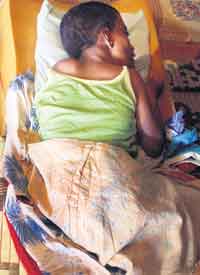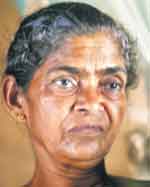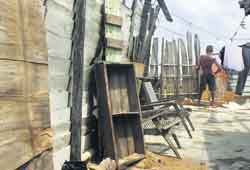|
|
||||||
|
Battered and broken The tsunami has made life even more difficult for this family in Koralawella, already suffering from poverty and ill-health
On her back for 17 long years, from babyhood to teen years – that has been the life of Anusha Ayanthi. She cannot turn or move. She cannot even lift a finger. She is manda buddika, says Vinitha Fernando, 58, explaining that her youngest daughter, the sixth, Anusha, is both mentally and physically disabled.
Anyone would think that this karma or cross, as
some may call it, would be the only sorrow that this single family
would have to face. No, the sorrows do not end there. What flows
out of the lips of Vinitha, with sadness, but also with stoic resignation,
sounds like a litany of woes. Vinitha’s husband, a carpenter, went in search of better prospects to Saudi Arabia, about four years ago. Having lived all their lives on the beach at Koralawella, the money he sent back, about Rs. 12,000 each month, went towards building a small home with a cement floor, a stone’s throw from the sea. What of the children? Only Anusha is living in a vegetative state? Tears fill her eyes, as Vinitha explains that her 35-year-old eldest daughter is both deaf and dumb. The son next to her, who is doing a little bit of welding work, is prone to fits and cannot sustain a job. The third, a daughter, is normal. “She is married and has two little ones. She lives with me, because I have pressure and cannot cope with the workload of looking after so many disabled children,” says Vinitha, adding that the fourth son is a victim of severe polio, but tries to chip in doing some paint work along with her fifth son who is a tinker. “Work is hard to come by.”
Around the same time that the tsunami struck, her husband too had a mishap in Saudi. He fell from a height and broke his leg. “Now there is a wire through his leg, and his employers are keeping him there to do odd jobs. He has to pay someone for everything, from getting his clothes washed to getting his meals,” she says. But he tries to send as much money as possible, because Anusha’s costs are very high. Living only on a diet of milk and rusks, Anusha needs two 400-gram packets of milk per week. As they need to provide nourishment, she is also fed Sustagen, but all at a cost to the family budget. She also has virulent fits and has to take two tablets a day, each costing Rs. 10. “My deaf and dumb sister looks after Anusha and cleans her faeces, because she does all that on the bed. We need a fan, otherwise the flies settle on her face, and she cannot chase them away,” says Varuni, who takes turns being in their tiny takarang home with her mother. “We cannot leave my deaf and dumb sister alone with her, because if she is in the kitchen and Anusha has the fit, she cannot hear her shrill screams.”
The day the tsunami came, all the beach folk had run across the road. Vinitha and her family found to their horror that Anusha had been taken by the first wave. Vinitha and her eldest daughter clung on to wooden planks, grabbed Anusha off the fast floating bed and carried her to the temple nearby. The little home the family had built with the father’s earnings was devoured by the angry sea, and now they live in a shack. They were also able to salvage a few of their belongings before the waves took them away. Vinitha has enclosed their home with planks scavenged from here and there, because most of their neighbours have moved away, making way for kasippu sellers and drug addicts to haunt the area. “I am worried about my daughters’ safety,” Vinitha says simply. With all their earnings being lavishly expended on Anusha, who is washed and cleaned scrupulously, we dare not ask what they would be having for lunch that day. Peeping into the tiny kitchen, the answer seems to stare us in the face. The few pots and pans there are empty. |
||||||
Copyright © 2006 Wijeya Newspapers
Ltd. All rights reserved. |


